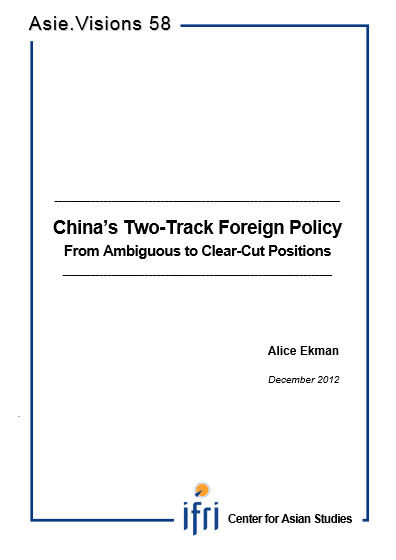China's Two-Track Foreign Policy: From Ambiguous to Clear-Cut Positions

This analysis examines the current ambiguities, priorities and approaches of Chinese foreign policy from a practitioner’s perspective, taking into account experiences of Beijing-based diplomats (interviews conducted in 2011 and 2012), in addition to recent Chinese foreign policy positions and official communications.
It leads to the following conclusions:
- The Chinese position on many foreign policy issues (climate change, nuclear proliferation, etc.) is hard to identify, even by practitioners in regular contact with Chinese diplomacy.
- If ambiguity remains, it is not only because of strategic opacity; on a majority of issues, China has not clearly decided on a position.
- Depending on the issue at stake, China adopts different foreign policy approaches. Two main approaches can be identified: when “core interests” are involved, China has a clear position and may adopt a more proactive foreign policy if needed. For other interests, the Chinese position is often undecided, and remains flexible depending on situational changes. In these cases, China adopts a passive foreign policy approach.
- Rhythm and relationship to time also differs according to this divide: China’s diplomacy tends to be much more anticipative and its decision-making process faster and more streamlined when dealing with “core interests” than with other interests.
- Lately, China’s definition of “core interests” is enlarging (inclusion of South China sea, of economic interests in general terms, etc.). This certainly reflects a reorientation of China’s foreign policy, but not a turning point.
- China’s foreign policy is likely to remain based on these two different approaches in the short and medium run, for several reasons: it is in China’s interest; domestic and international pressures for a more proactive strategy are limited; current foreign policy institutional mechanisms as well as the absence of clear-cut ideological foundations prevent the emergence of a more consistent strategy and; above all, the central government’s top priority remains domestic stability.

Available in:
Regions and themes
ISBN / ISSN
Share
Download the full analysis
This page contains only a summary of our work. If you would like to have access to all the information from our research on the subject, you can download the full version in PDF format.
China's Two-Track Foreign Policy: From Ambiguous to Clear-Cut Positions
Related centers and programs
Discover our other research centers and programsFind out more
Discover all our analysesQuest for Strategic Autonomy? Europe Grapples with the US - China Rivalry
Building on the 2020 European Think Tank Network on China (ETNC) report, which assessed Europe’s positioning amid the strategic rivalry between the United States and China, this edition re-examines the geopolitical landscape in light of the Covid-19 pandemic, Russia’s war in Ukraine and Donald Trump’s return to the White House. This report features 22 national chapters and one dedicated to the EU, analysing the evolution of Europe’s relations with Washington and Beijing, the range of approaches to dealing the US-China rivalry and how these are expected to evolve.

France seeks third way between US and China in Southeast Asia
The French leader sent a message of partnership but gave few concrete details on sustained engagement plans.
Mid-term Elections in the Philippines: The Clan War Reaches New Heights
Three years after the last general and presidential elections, Filipino voters once again went to the polls on May 12, 2025, to elect their municipal and parliamentary representatives.
India’s Green Hydrogen Strategy in Action: Policy Actions, Market Insights, and Global Opportunities
India is poised to remain the world’s fastest-growing major economy, and this rapid growth is driving a sharp rise in energy demand. As the most populous country on the planet, India urgently needs to decarbonize its energy systems.












